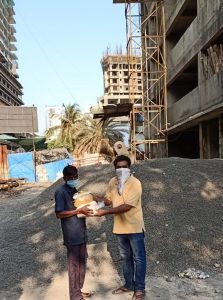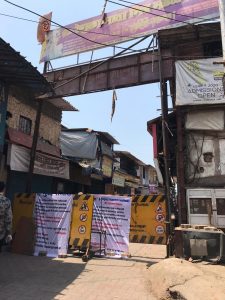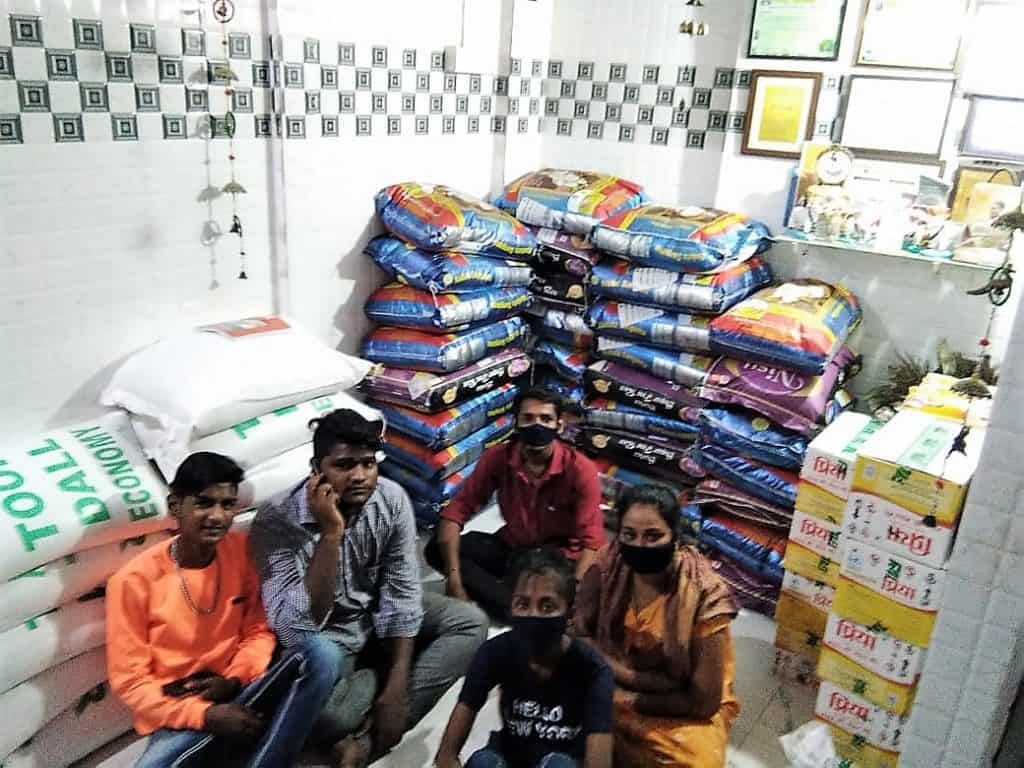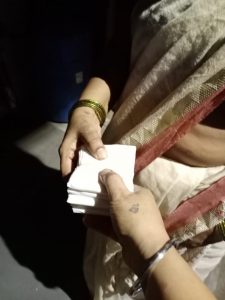India’s COVID-19 lockdown, one of the strictest in human history, was recently extended by the Prime Minister of India until the 3rd of May. Many stranded migrants waiting for public transport to take them back home or for production activities and markets to resume functioning were disappointed one more time, after the PM’s announcement on April 14th.
Along with poor migrants, other economically weaker sections in the city have been struggling for survival in the slums of cities like Mumbai, Delhi, Surat and Bangalore. This extension would seem like a terrible fait accompli and a final nail in the coffin of India’s informal labour workforce, if it weren’t for urban India’s civil society network that has been toiling to ensure that these poorer sections can at least survive through these difficult times.
In particular, youth have taken to the helm with vigour and vitality, improvising ingenious strategies to deal with the crisis. One such heart-warming tale of courage and stoicism comes from Bhagat Singh Nagar, a large slum colony located in Goregaon, Mumbai.
Bhagat Singh Nagar is a dense slum, home to a diverse population of about 1000 households spread across four to five smaller slum pockets. A group of youth from the slum gathered under the banner of ‘Bhakar Foundation’ (Bhakar: A Jowar based bread, a staple food of Maharashtra), and reached out to Nirmala Niketan College of Social Work based in Churchgate on March 26, 2020. The college had started a community-based senior citizen’s project named PRAVAS in the same community a year ago. Upon receiving an appeal for help from the Bhakar Foundation, the faculty in-charge of PRAVAS connected this motley group of youth to various organizations that were providing food and essential commodities to the needy.

The list of beneficiaries included the families of 52 construction-workers left stranded in a nearby construction site too. Pic: Bhakar Foundation
The principal of Nirmala Niketan College of Social Work swung into action, coordinating with Big Bazaar Goregaon. Grains, oil, pulses, rice, dal and other essential food items for around 170 families living in the colony were made available and sent to Bhakar Foundation for distribution. The youth had diligently listed out the most impoverished pockets of the slum and visited each household in these pockets to take accurate stock of the situation.
Students of Nirmala Niketan placed for fieldwork in PRAVAS also provided Bhakar Foundation with a list of senior citizens. Students kept in touch with the elderly to keep track of daily developments. One student also independently managed to arrange medicines to be delivered to Bhagat Singh Nagar.
The final list prepared by Bhakar Foundation consisted of the most desperate – families without ration cards, the elderly, transgenders, rickshaw drivers, daily wage earners, single women households and domestic workers. They included the families of 52 construction-workers left stranded in a nearby construction site too.
Good Samaritans

Amidst the lockdown, strict cordoning of internal lanes meant that some residents could not even access community toilets located a mere lane or two away. Pic: Bhakar Foundation
Along with Nirmala Niketan college, help came pouring in from civil society organizations like Desh Seva Samiti, Mantra Foundation. ESSAR Foundation, Citizens for Justice and Peace as well as individual donors. ESSAR Foundation and Mantra foundation began providing 1200 and 300 cooked food packets respectively every day. These food packets were received and distributed by Bhakar Foundation across Bhagat Singh Nagar.
Since the Bhakar Foundation was yet to be registered, its founders decided not to accept cash but only commodities that could be distributed. They transformed their own homes into makeshift warehouses for collecting, storing and packaging the donated commodities. Local tempos were used to ferry the packages deep into the slums and into the hands of the most desperate.
The youth faced tremendous challenges in their operations. Amidst the lockdown, internal lanes in the colony were cordoned off as positive COVID-19 cases were detected. The cordoning was so serious in some lanes that slum dwellers were refused access to community toilets located a mere lane or two away by the authorities. Some food kits had to be ferried on hand-carts or in the dead of the night to avoid inviting questions from the police. Containers with food-grain kits would be kept near the barricades to be picked up by someone from the next lane, like a relay, till the kits reached their destination. The complex coordination that this exercise called for, was handled telephonically and using messaging apps like WhatsApp, Zoom etc by the Bhakar Foundation Team.
Unforeseen hurdles
But more sensitive, tricky issues began to emerge as the team progressed with its work of distribution.
In the words of a member of the Foundation, “We began to be viewed as a threat to the political parties who were trying to distribute food under their party banners. We were not distributing food for any gain and they could not reap any gain from our activities since we were not politically affiliated. And it is a fact that these political parties, in cahoots with the police, are not reaching out to the most vulnerable minorities, like Matangs, Buddhists and Muslims. So if we were helping them, then why should they object?”
The police and goons of some prominent political parties allegedly obstructed these youth many times during their distribution efforts, accusing them of being partial to phuktes (Marathi: useless, good-for-nothings). These adversaries wanted control over the distribution of stock acquired by Bhakar Foundation and its allied organization, which the group refused to relinquish. Shortly after, the youth were labelled as troublemakers, delinquents who were refusing to obey the lockdown and follow the rules. This sudden blanket ban on the Bhakar Foundation’s activities took place despite the team having a written police permission document from the Assistant Commissioner.
This sudden stoppage of Bhakar Foundation’s distribution activities meant that overnight, more than 1500 people belonging to the poorest were suddenly left without food. One of the team members says, “We used to go and see if any food was being wasted, if people were actually eating the food; not once did I come across a single packet that was left uneaten. This clearly shows that these people were hungry and desperately needed the food.”
The blanket ban was followed by a chain of reactions. The youth were inundated with calls from slum dwellers who were waiting for food packets. The food suppliers also needed to decide if they should continue providing food or divert the relief elsewhere.
At this point, members of the team began flooding their social media channels, stating that they had to suspend distribution activities as per the orders of the local police despite an earlier police permission. The alumni and faculty of Nirmala Niketan began contacting higher authorities and political representatives to resolve the issue. The local police backed off after two days, but by then ESSAR Foundation had diverted the food packets numbering 1200 per day somewhere else.
The stock of grain, pulses, oil packets and other uncooked ration that was distributed by Bhakar Foundation during the first few days of the lockdown were nearing exhaustion, so the volunteers now reached out to more donors and was able to procure another significant stock of grains, flour, oil and pulses from Citizens for Justice and Peace. After receiving this new stock of donations, Bhakar Foundation resumed its distribution efforts in full-swing.
Different needs
During their distribution, one consistent concern raised by the women in the community was non-availability of sanitary napkins. Since these were daily wage earners and their work had stopped, most could not afford to purchase sanitary napkins like they usually did. Bhakar Foundation flagged this as an urgent requirement before the donors.
Tata Institute of Social Science (TISS), Mumbai along with Municipal Corporation of Greater Mumbai (MCGM) responded by sending cartons of sanitary napkins. These sanitary napkins were produced by the SHGs of MCGM located across Mumbai. One private donor also contributed a large stack of sanitary napkins to the Foundation.
To maintain transparency, detailed lists with addresses of beneficiaries were documented by the group and photographs taken during distribution were posted on WhatsApp and Facebook. At one point, the Bhakar Foundation stopped showing the face of beneficiaries after a concern was raised in a team meeting. They devised a new style of clicking photographs as can be seen here.
Springs of hope
The entire team working under the banner of Bhakar Foundation consisted of youth between 18 to 28 years of age, all belonging to impoverished backgrounds. They themselves had been struggling for access to education, means of living, social mobility and identity long before the pandemic. Yet, the distribution did not include the team’s own families until the very end. The team members decided that they would only accept donations for themselves once the community had enough. However, when the donors discovered this, they insisted that the team members accept donations and pay more attention to their own health and well-being, since the community was now banking on them.

Members of the team transformed their own homes into makeshift warehouses for collecting, storing and packaging the donated commodities. Pic: Bhakar Foundation
The volunteers who helped the group in procurement, distribution and packing of ration were neighbours, mothers, friends and siblings. Help was mobilized by virtue of proximity and spirit. The leader of the Foundation decided not to include older women in packing because of their feeble health, a consequence of decades spent laboring as domestic workers. His own mother came down with a cold because of the dust encountered in the packing process.
Now, the Bhakar Foundation hopes to continue serving the community long after the lockdown ends on May 3rd. They have ably proven that despite India’s nature as a complex, stratified nation facing multiple odds and barriers, it is still possible to create resilient networks that can work to support those who need it the most.

What the Bhakar Foundation is doing is the way to go. All of us need to take care of those around us who are in dire straits. We would like to get in touch with Bhakar Foundation. Kindly make it possible.
Let the government do what it has to. What about you & me, people who live wherever, why can’t we do our bit for those who are in need and live down our streets? Pay our household helps, watchmen their salaries though they may not work during this time period, not evict people who can’t pay rent… The migration workers are homeless and hungry because of us, people who were heartless and refused to take responsibility for those who were assisting us to run our businesses and today they became nobody. It’s still not too late… Reach Out… Share… They are our own, the Human Species.
What the Bhakar Foundation is doing is the way to go. All of us need to take care of those around us who are in dire straits. We would like to get in touch with Bhakar Foundation. Kindly make it possible.
Let the government do what it has to. What about you & me, people who live wherever, why can’t we do our bit for those who are in need and live down our streets? Pay our household helps, watchmen their salaries though they may not work during this time period, not evict people who can’t pay rent… The migration workers are homeless and hungry because of us, people who were heartless and refused to take responsibility for those who were assisting us to run our businesses and today they became nobody. It’s still not too late… Reach Out… Share… They are our own, the Human Species.